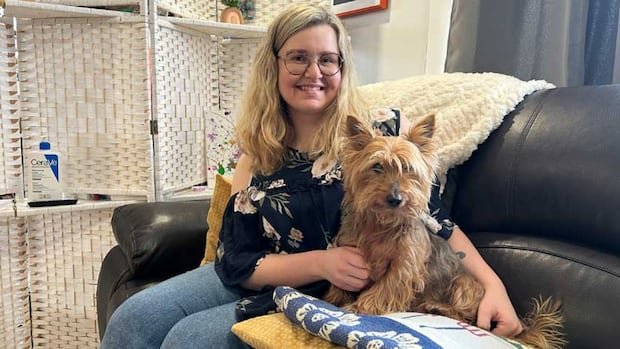
When Susannah McKenzie-Sutter heard her cousin in Ontario needed a kidney transplant, the 28-year-old Saint John woman didn’t hesitate to offer one of hers.
She hasn’t kept in close touch with McKenzie Smith in recent years but has fond childhood memories of spending summers with her “cool older cousin.”
Preliminary blood tests showed she’s a good match.
But McKenzie-Sutter quickly learned her plans could be thwarted because she’s one of thousands of New Brunswickers without a family doctor.
The hospital in London, Ont., where the transplant would be done, told her she cannot donate — or even get tested to confirm she’s a good candidate — without having a family doctor or a nurse practitioner.
Susannah McKenzie-Sutter, 28, of Saint John wants to donate one of her kidneys to her cousin in Ontario, but first she’s had to scramble to find a family doctor.
“That was a big, big shock and I definitely felt quite frustrated,” McKenzie-Sutter said.
Her 40-year-old cousin in Kitchener is in end-stage kidney failure.
Smith has a genetic form of chronic kidney disease, which progresses slowly, often without symptoms, until dangerous levels of fluid, electrolytes and wastes, such as urea and acids, build up in the body.
Her kidney function has dropped to about eight per cent. She is easily fatigued and requires several medications to manage her symptoms, such as anemia and high blood pressure.
“Being forced to confront my own mortality is scary,” Smith posted on the Transplant Ambassador Program website and on social media in mid-January, seeking a live donor.
Her doctors predict she will be in full kidney failure within two or three months, Smith said in an interview.
2,450 Canadians on waitlist for kidneys
The median wait for a deceased kidney donor in Canada is more than three years, according to the Canadian Institute for Health Information.
As of the end of 2023, the most recent data available, about 2,450 Canadians were on a waitlist. Eighty-five people died waiting that year.

Without a transplant, Smith will soon have to go on dialysis — either hemodialysis, usually done at a medical centre three days a week, four hours each day, or peritoneal, which can be done at home overnight but must be done daily.
“That was definitely sad to hear,” McKenzie-Sutter said. “I didn’t realize how bad it had gotten. And so I wanted to be able to help if I could.”
She reached out to Smith that day.
Genetic kidney disease runs in the family, and McKenzie-Sutter knows first-hand how life-changing a transplant can be, she said.

Her maternal grandfather had a transplant from a car accident victim in the 1970s — one of the earliest transplants in Canada. Her aunt — Smith’s mother — and Smith’s sister have had living donor transplants.
It gave them their lives back, McKenzie-Sutter said, describing life on dialysis as restricted and difficult.
Smith was overwhelmed by her cousin’s generous offer. “It’s just such an amazing thing and such a gift to give to someone,” she said.
Post-transplant monitoring required
Neither cousin ever imagined McKenzie-Sutter’s lack of a primary care provider could become an obstacle.
But potential living donors must have a complete medical checkup to confirm they are healthy enough to donate.
In addition, they require annual checkups after the donation to ensure their remaining kidney is working correctly since it has to work harder to make up for the removed kidney, McKenzie-Sutter learned from the London Health Sciences Centre.
Nurse practitioner left a year ago
The need for ongoing care “does make sense to me,” she said. “But I was very surprised because I know there’s such a shortage [of family doctors and nurse practitioners], especially out here in Atlantic Canada.”
Her partner recently lost his family doctor to retirement, and she hasn’t had one since she moved to Saint John from Newfoundland and Labrador in 2020 after completing a master’s degree in music. A nurse practitioner she found left the province in April 2024.

Since then, McKenzie-Sutter has been registered with N.B. Health Link, which replaced Patient Connect N.B., the waitlist for doctorless patients, and aims to provide patients with access to primary-care providers offering in-person, telephone and online appointments.
She has never received an email or phone call, she said.
41,000 registered with N.B. Health Link in limbo
More than 65,000 New Brunswickers are registered with N.B. Health Link and eligible to receive primary care through it, according to the Health Department.
An additional 41,000 are registered but waiting for more clinics to open or for existing clinics to expand.
“This is, without a doubt, a stressful situation for this individual,” David Kelly said in an email on behalf of the department.
“The department is examining the kinds of primary care options that could be available to her.
Improving access to primary care is a priority, Kelly said, pointing to Premier Susan Holt’s pre-election pledge to open 30 collaborative health-care clinics, including 10 in 2025, Saint John among them.
‘Poignant reminder’
McKenzie-Sutter said it’s been difficult and “a bit scary” trying to navigate the health-care system without a primary care provider, but wanting to donate her kidney has made the issue even more pressing.
And she’s not alone, she said. She was told at least one other New Brunswicker was previously willing to donate in London, but was turned away because they didn’t have a primary care provider.

“The challenges patients face trying to navigate the living organ donor process without a family physician is a poignant reminder of the widespread impacts of the primary care crisis,” said Dr. Lise Babin, president of the New Brunswick Medical Society and a family doctor in Dieppe.
“This is another reason why it is so important for all health-care stakeholders to prioritize improving primary care access, through team-based clinics, enhanced retention and recruitment strategies, and every other means at our disposal.”
Advocacy urged to enable ‘gift of life’
Rosanna Mitchell, executive director of the Kidney Foundation of Canada’s Atlantic branch, called the situation “concerning — especially for those who are in need of kidney transplant and have someone willing to step up and make that live donation, essentially giving the gift of life.”
People should contact local politicians to “advocate for the family physician crisis to be seriously considered,” Mitchell said.
“We just have to keep ringing the bell with our members of government to remind them how important that piece is.”
Delay adds to deterioration
McKenzie-Sutter hated breaking the news to her cousin.
“I definitely felt like I was letting her down.”
She called at least 14 clinics, desperately trying to find a doctor, but many of them didn’t even let her finish her plea.
“They’re like, ‘Sorry, we’re not taking any new patients. We’re absolutely booked.'”

Smith admits it’s “absolutely disappointing” McKenzie-Sutter faced such challenges trying to do something good.
“And with something like kidney disease, as you can imagine, it’s very time-sensitive,” she said. “My function is deteriorating a little each day and each day that goes by, where there’s a delay or there’s something that we need to wait on, that affects me negatively, and I feel sad and worried the longer it takes.”
Doctor found
Fortunately, McKenzie-Sutter said, she has finally, through a friend, found a doctor willing to take her on after weeks of scrambling. She has an appointment April 2 and will begin the screening process soon after.
She recently completed blood and urine tests, which indicate her kidney function is good.
And in mid-May she will travel to London for two days of testing, including a renal scan, electrocardiogram or EKG and a chest X-ray.
Only worry is getting screened-out
“I’m not really worried about it because it’s quite thorough testing,” she said. “So if there’s anything to be concerned about, I would find out in the testing process,” said McKenzie-Sutter, who described her family as supportive.
And the surgery itself is “low risk,” she said — comparable to a gallbladder removal. It’s now done laparoscopically, with three small incisions and a thin, lighted tube with a video camera.

McKenzie-Sutter, who is self-employed as a violinist and music teacher, will face some travel expenses and won’t be able to work for four to six weeks during recovery, but she believes Ontario’s reimbursement program for living organ donors will cover most of that.
“To be honest, I’m only worried that I’ll get screened out,” she said.
“That’s the thing that’s more nerve-wracking because I know that would just prolong McKenzie’s health situation longer. And I would feel bad that we spent all this time investigating me when it could have been spent investigating someone else.”
It just feels to me like the right thing to do.– Susannah McKenzie-Sutter, potential donor
Smith said she’ll never be able to repay her and will be forever grateful.
McKenzie-Sutter said Smith doesn’t owe her anything. “If I can help, I would like to, and I would hope that someone would help me if I was in a similar situation.
“It just feels to me like the right thing to do.”










